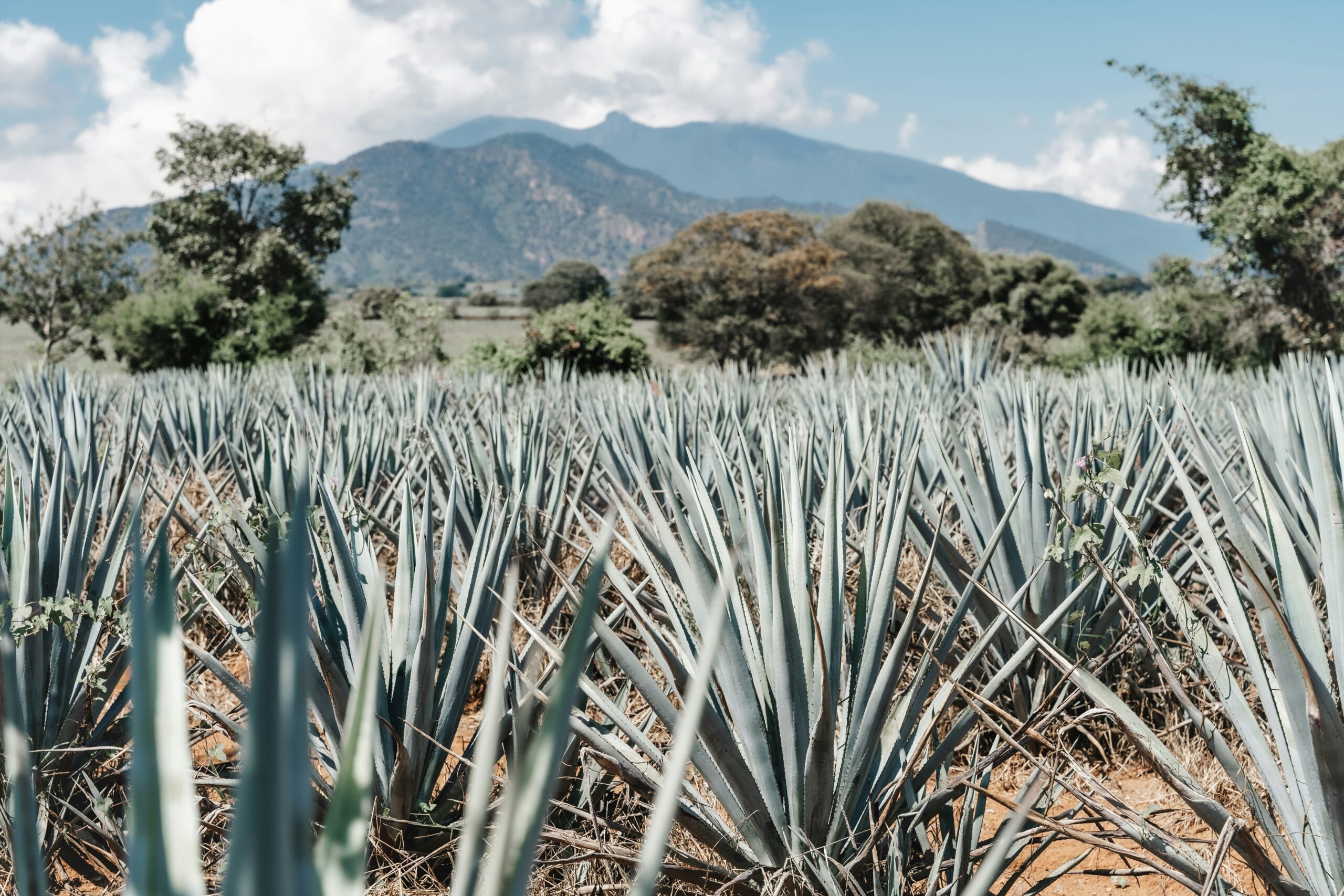The agave is a plant widespread in areas of North and South America. The agave plant family includes hundreds of species. The most pervasive is the American agave, from which valuable medicinal substances are extracted. Various leaf sizes and appearances characterize the species belonging to the Agave genus. The plants are usually confused with aloe vera, as they have similar spreading leaves.
People use agave for various purposes. The plant can serve an ornamental function but is also used to produce food products. Commonly, agave is used to make alcoholic beverages such as tequila. In addition to it, a well-known product made from agave is syrup. Agave syrup is a natural sugar substitute that provides healthy ingredients. Scientific reports speak of various health benefits of agave. Please find out more about agave and its properties.

Agave is a plant with a wide range of uses. The plant is very popular in Mexico![]() , where agave is a frequently used raw material. In those areas, agave is of great cultural and commercial importance. The use of agave is mainly based on the stem. Among other things, agave can be used to produce:
, where agave is a frequently used raw material. In those areas, agave is of great cultural and commercial importance. The use of agave is mainly based on the stem. Among other things, agave can be used to produce:
The agave is a plant from which, among other things, alcoholic beverages can be produced. A well-known alcoholic drink produced from this plant is tequila![]() . The original tequila is made from mature agave, or more precisely, from the fermented juice of the blue agave. In addition, agave syrup
. The original tequila is made from mature agave, or more precisely, from the fermented juice of the blue agave. In addition, agave syrup![]() is also a popular product based on this plant. The syrup is a natural sweetener extracted from certain species of agave. Agave syrup consists mainly of sugars, but valuable bioactive compounds can also be found in it.
is also a popular product based on this plant. The syrup is a natural sweetener extracted from certain species of agave. Agave syrup consists mainly of sugars, but valuable bioactive compounds can also be found in it.
Various species of the agave genus are used in traditional Mexican medicine to treat multiple conditions. The leaves and other parts of the plant contain different medicinal compounds. Today, agave is still being used to produce medicinal products. Agave can be used as a supplement![]() . Studies on the subject have shown that taking agave as a supplement benefits some health-related parameters.
. Studies on the subject have shown that taking agave as a supplement benefits some health-related parameters.

Agave is also used in the fuel industry. The plant can be used to produce ethanol-based fuels. It has been noted that agave fuel is a viable investment as the plant is drought tolerant, and thus, agave fuel is gaining popularity in Australia.
Textiles can also be produced from the agave garana plant. Materials made with agave fibers and resins are eco-friendly and natural. Natural textiles have many advantages, including being completely biodegradable and ecologically friendly.
Agave is used as a traditional healing method in Mexico and other countries. Agave has many active compounds that are essential in medical terms. The plant has various health benefits and is used for multiple ailments. Health benefits of agave include:

Agave is mainly known for its anti-inflammatory properties. In traditional medicine, agave was used to treat various inflammatory conditions. Agave contains compounds that help fight inflammatory processes in the body. These mainly include flavonoids![]() and saponins
and saponins![]() . Flavonoids are natural bioactive plant compounds that act as pigments. Saponins are plant-derived chemical compounds classified as glycosides, i.e., substances that are derivatives of sugars. These substances have anti-inflammatory effects, which help treat arthritis, stomatitis, and other infections.
. Flavonoids are natural bioactive plant compounds that act as pigments. Saponins are plant-derived chemical compounds classified as glycosides, i.e., substances that are derivatives of sugars. These substances have anti-inflammatory effects, which help treat arthritis, stomatitis, and other infections.
Agave has antibacterial properties, which means that it effectively fights bacterial infections. The plant contains compounds that inhibit the growth of bacteria and viruses. This is guaranteed by flavonoids and alkaloids, used in medicine to treat various diseases and ailments. Scientific studies have shown that agave has antimicrobial activity against S. aureus![]() and S. thyphi
and S. thyphi![]() . The topic is being expanded for future antimicrobial agents because of the potential of compounds from agave leaf extracts.
. The topic is being expanded for future antimicrobial agents because of the potential of compounds from agave leaf extracts.
Due to the antioxidant properties![]() of agave, the plant also has anti-cancer effects. Agave contains many natural antioxidants that fight free radicals and reduce the risk of cancer, disease, and skin aging. Antioxidants benefit skin health, which is why agave has been used in traditional medicine to treat wounds, ulcers, and fractures.
of agave, the plant also has anti-cancer effects. Agave contains many natural antioxidants that fight free radicals and reduce the risk of cancer, disease, and skin aging. Antioxidants benefit skin health, which is why agave has been used in traditional medicine to treat wounds, ulcers, and fractures.

Agave also has a diuretic effect, which stimulates urine production, facilitating the removal of harmful metabolic products and excess uric acid, thus cleansing the body of toxins. Diuretic preparations are used in urinary tract infections because they speed up bacteria removal. Because of this, agave is often used to treat urological disorders.
Another advantage of agave is its laxative properties, which increase fecal mass volume due to water absorption. Through its mechanism, intestinal transit is stimulated. Also, agave has been a beneficial medicinal product due to prebiotics, which promote the growth of beneficial bacteria in the large intestine. Among other things, the plant has been used to treat gastrointestinal infections.
Various types of agave are also used to treat metabolic diseases like diabetes. In Mexico, agave rich in saponins and other active compounds is used to improve diabetic patients' states. Extracts from agave juice have shown antihyperglycemic![]() effects. The mechanism involved the modulation of insulin secretion by pancreatic cells. In addition, agave may have a beneficial impact on lipid levels, lowering cholesterol. Further research on the use of agave in treating metabolic syndromes is required, as it may provide benefits and new treatment options.
effects. The mechanism involved the modulation of insulin secretion by pancreatic cells. In addition, agave may have a beneficial impact on lipid levels, lowering cholesterol. Further research on the use of agave in treating metabolic syndromes is required, as it may provide benefits and new treatment options.
A popular product to baize agave is agave syrup, also known as agave nectar. Agave is a plant whose juice, fibers, leaves, stems, and peels can be extracted for industrial purposes. Production of agave syrup can vary depending on the region and type of agave. Different species of agave are used for syrup production, including Agave americana![]() and Agave tequilana
and Agave tequilana![]() . Agave syrup has better nutritional value than sugar, so it is often used as a natural sweetener. This vegan option is more recommended than sucrose. However, it is not entirely free of sugars and carbohydrates. So, we'll take a look at the nutrients in agave nectar.
. Agave syrup has better nutritional value than sugar, so it is often used as a natural sweetener. This vegan option is more recommended than sucrose. However, it is not entirely free of sugars and carbohydrates. So, we'll take a look at the nutrients in agave nectar.

In recent years, the popularity of natural ingredients has increased significantly in the consumer aspect. The food industry often uses agave nectar as a sweetener. Agave syrup has a sweet taste due to fructants derived from agave cores. However, it is essential to note that the honey substitute agave syrup also consists mainly of sugars and carbohydrates. However, it also has other ingredients. The proportions and amounts of nutrients in agave syrups can vary, depending on the type. However, agave syrup's nutrients can include:
Agave syrup consists mainly of carbohydrates extracted from the plant during production. Fructans are the main water-soluble carbohydrates in agave species. Agave syrup has a different carbohydrate profile compared to other sweeteners. There are more natural compounds in the nectar, which exhibit antioxidant activity, among other things.
However, the carbohydrate and sugar content of agway syrup is high. Nectar consists mainly of fructose![]() , which usually contains more than 60%. In addition, it contains trace amounts of sucrose and glucose. These sugar proportions give agave syrup a low glycemic index despite its high sugar content. This is important, among other things, for people with diabetes, whose product will not excessively raise blood sugar.
, which usually contains more than 60%. In addition, it contains trace amounts of sucrose and glucose. These sugar proportions give agave syrup a low glycemic index despite its high sugar content. This is important, among other things, for people with diabetes, whose product will not excessively raise blood sugar.
Agave syrup does not contain a large amount of protein. Protein is contained in trace amounts in this product, as the syrup consists mainly of sugars. Therefore, agave nectar does not provide protein, while its high carbohydrate content helps increase energy.
Agave syrup is not rich in soluble dietary fiber. The prebiotic properties recommended for digestive health are due to the presence of other ingredients. However, agave fructans are used in the food industry for their nutritional properties, such as soluble dietary fiber. Agave fructans are the natural spare carbohydrates in the agave plant. The substances are used in the production of many different food products.
Agave syrup also contains a small amount of fat. Therefore, people on a low-fat diet can consume this product. However, be aware of the high fructose content, which in excess can contribute to fat mass.

Agave syrup has B vitamins. We find thiamine, riboflavin, and niacin, among others. The most significant amounts are for folic acid![]() . Vitamins of this kind affect various essential aspects of health, so it is worth taking care of your diet to avoid B-vitamin deficiencies. However, agave syrup does not provide large amounts of B vitamins, so there should be other sources of these ingredients.
. Vitamins of this kind affect various essential aspects of health, so it is worth taking care of your diet to avoid B-vitamin deficiencies. However, agave syrup does not provide large amounts of B vitamins, so there should be other sources of these ingredients.
In addition, the syrup also contains small amounts of vitamin K. Vitamin K deficiency is quite rare in medical statistics. Vitamin K is found in many foods and is synthesized to some extent by bacterial microflora in the digestive tract.
Agave nectar also contains small amounts of minerals. The syrup contains a relatively high amount of sodium![]() relative to the daily requirement. Sodium is an electrolyte and an essential mineral for proper functioning. It helps in many processes in the body. However, excess sodium is unfavorable and can cause unpleasant symptoms.
relative to the daily requirement. Sodium is an electrolyte and an essential mineral for proper functioning. It helps in many processes in the body. However, excess sodium is unfavorable and can cause unpleasant symptoms.
What sets agave syrup apart from other sweeteners is its bioactive content. The syrup contains various substances responsible for the plant's health benefits. These components primarily include polyphenols![]() . These substances reduce the risk of cardiovascular diseases and cancer. Most exhibit strong antioxidant and free radical-destroying activity, which is important in the body's cleansing and regeneration processes.
. These substances reduce the risk of cardiovascular diseases and cancer. Most exhibit strong antioxidant and free radical-destroying activity, which is important in the body's cleansing and regeneration processes.

Agave nectar is a popular sweetener. The significant advantage of this sweetener is its low glycemic index. Although the product consists mainly of sugars, it does not raise sugar in your blood as quickly as other sweeteners. In addition, fructose-based syrup is intensely flavorful, meaning you only need a small amount of nectar to get the desired level of sweetness. This makes it possible to limit the level of sugars eaten in the diet.
However, it should be noted that agave syrup is caloric despite these properties. The calorie content of 100 g of agave syrup is 310 kcal![]() . Regardless of the type of sugar, calories do not change. Therefore, the sugars in agave syrup act the same way as those in other sweeteners, such as corn syrup, which is seen as less healthy. Also, beware of excessive consumption of fructose-based products. Excesses associated with this ingredient can affect fat accumulation in the liver, which has been linked to various diseases.
. Regardless of the type of sugar, calories do not change. Therefore, the sugars in agave syrup act the same way as those in other sweeteners, such as corn syrup, which is seen as less healthy. Also, beware of excessive consumption of fructose-based products. Excesses associated with this ingredient can affect fat accumulation in the liver, which has been linked to various diseases.

Agave syrup can be used culinarily in a variety of ways. It is used as an ingredient added to dishes to enhance flavor. Agave syrup mainly works well in sweet dishes. Like honey, the syrup can replace sugar. Therefore, adding agave syrup to dressings and homemade baked goods can be more beneficial than adding white sugar. It is also ideal for sweetening coffee, tea, cold drinks, or cooking. However, remember that the calorie content is still high, and syrup should not be consumed excessively.
On the other hand, if you care about the health benefits of agave, you can introduce supplements into your diet. Remember, however, that any supplement should first be consulted with a doctor. Various parts of the plant are used to produce agave-based medicines, including the juice and roots. Agave can, therefore, be taken orally or as an infusion. In addition, agave can be applied to the skin due to its health-promoting properties.
However, be sure to choose agave products responsibly. The plant can have side effects, mainly when misused. Agave plants without any industrial processing applied directly to the skin can cause unpleasant symptoms of irritation. In addition, more research is needed on taking agave orally. Agave and agave-based products can be dangerous for pregnant women, among others. It is, therefore, worth taking every precaution when using agave products. When in doubt, seek professional medical advice on agave products.
Agave is a plant from which valuable medicinal substances can be extracted. In Mexico, agave was used to treat various ailments. Various types of products, including medicines, are produced from agave. Agave-based medicinal products take advantage of its many health benefits. Popular food products also include agave syrup. Nectar is considered a healthy sweetener. However, despite containing valuable nutrients, agave syrup contains high amounts of fructose, which in excess is not beneficial to health.